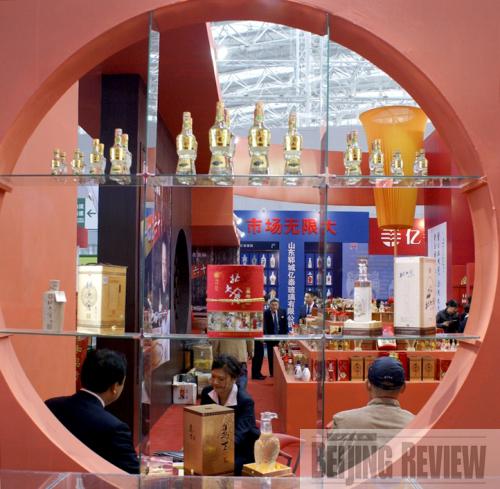|
Maintaining the momentum
 |
|
ROBUST GROWTH: The alcohol industry has secured robust growth for 10 years and consistently attracted overseas investors since 2005 (WANG JIANWEI) |
The alcohol industry has secured robust growth for 10 years and even the global financial crisis failed to slow its pace.
The Shanghai office of A.C. Nielsen, a global marketing research firm, released a report on China’s white spirits market at the China White Spirits Summit from July 16 to 17 in Shanghai. The report said that in the first four months of 2009, white spirits sales in large supermarkets in 18 major cities increased 15.8 percent from the previous year, while imported liquors saw negative growth. Sales of brandy, beer and red wine, meanwhile, decreased 22.4 percent, 9.2 percent and 2 percent, respectively, but whiskey sales remained stable.
The white spirits industry remained intact when sales of almost all industries dived from the sudden impact of the global financial turmoil in the second half of 2008. Statistics from the industrial association show 19 enterprises posted profits of more than 100 million yuan ($14.6 million) in 2008, while in 2007 only 10 were on the list; their profits totaled $14.32 billion yuan ($2.1 billion), accounting for 66.81 percent of the industry.
They have kept the growth momentum this year. Statistics from CITIC Securities Co. Ltd. show the industry reaped 76.74 billion yuan ($11 billion) in sales revenue in the first five months, up 21.95 percent year on year, and 10.75 billion yuan ($1.57 billion) in profits, up 9.22 percent.
By 2015, as much as 60 percent of China’s population will consist of young people and middle-aged adults, while the majority of alcohol consumers range in age from 35 to 44. These factors promise bright market prospects for China’s white spirits producers, Liu said.
Overseas investments
The high growth of China’s white spirits market has consistently attracted overseas investors. Large amounts of foreign capital have been injected into white spirits producers since 2005.
In that year, Thailand’s TCC Group bought out Yulinquan Brewery in Yunnan Province for 55 million yuan ($8 million), marking the first foreign investment in China’s white spirits industry. Moet Hennessy, the wine and spirits group of French fashion power house LVMH, acquired a 55-percent stake in Wenjun Distillery from the parent firm, and one of China’s premium white spirits companies, Sichuan-based Jiannanchun in 2007.
While foreign capital eyed second-tier white spirits makers at the beginning, they are now courting major players in China’s premium white spirits market. Goldman Sachs Group Inc. has also spent $52 million buying a 25-percent stake in Anhui-based Kouzi Jiuye Co. Ltd., a private distilled spirits producer. As one of China’s top 10 brands of white spirits, Kouzi Jiuye has generated more than 1 billion yuan ($146.4 million) in annual sales in recent years.
Foreign investors have great interests in the sustained high growth of China’s white spirits industry, especially major players that enjoy brand recognition in the premium white spirits market, and have the lion’s share of the market, said Zhao Jianhua, Secretary General of the White Spirits Branch of the China Alcoholic Drinks Industry Association.
The following case was the first of all foreign investments in China’s well-known white spirits brands. Sichuan Shuijingfang Co. Ltd. is one of China’s premium white spirits brands and a listed company. U.K.-based Diageo Highlands Holding B.V., a subsidiary of the world’s largest liquor market Diageo Plc. acquired a 43-percent stake in Sichuan Chengdu Quanxing Group Co. Ltd., while the latter held 39.48 percent of the equity in Shuijingfang at the end of 2006.
Diageo also raised its stake in Quanxing to 49 percent on July 29, 2008, when the labor union of Shuijingfang sold a 6-percent stake in Quanxing to Diageo.
Growth forecast
Earlier this year, the Industrial Research Center of Shenzhen-based Zhongtou Information Consulting Co. released a report on China’s white spirits market investments from 2009 to 2012.
The document predicted sales revenues of the alcohol industry will jump 21 percent to 171 billion yuan ($25 billion), with profits up 31.5 percent to 24.5 billion yuan ($3.6 billion) in 2009. By 2012, profit margins are expected to increase 31.8 percent annually to reach 56.1 billion yuan ($8.21 billion). | 